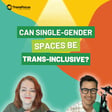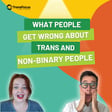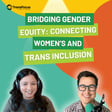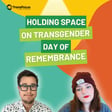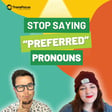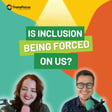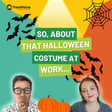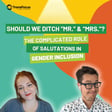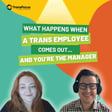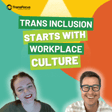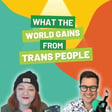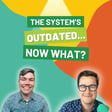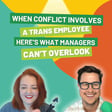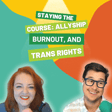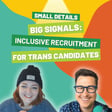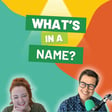Introduction to 'Gender in Focus'
00:00:02
Speaker
This is Gender in Focus. I'm El and each week I sit down with the president of Transfocus Consulting and all-round gender diversity genius, Kai Scott. I get to ask all the questions you've ever wanted to ask about how to make the workplace and the world a better place for trans and non-binary people.
00:00:20
Speaker
Let's get into it.
What is the true meaning of Pride?
00:00:23
Speaker
It's Pride season, and most people think of it as a time of parades, parties, and rainbow everything. But behind the glitter is a deeper story. Where did pride actually come from?
00:00:35
Speaker
Who is it really for today? And why do some people in the 2SLGBTQIA community feel more disconnected than ever from pride?
Pride's history and significance in 2025
00:00:44
Speaker
In this episode, we dig into the history without the lecture, explore our how corporate campaigns both lift up and sometimes let down our communities and talk frankly about what pride means for trans and non-binary people, especially in 2025. We'll also ask our allies truly showing up or just showing off what gets overlooked and how can we make pride, not just a moment of celebration, but a launch pad for lasting change. I'm joined by my esteemed colleague, El
00:01:15
Speaker
How are you doing? but Doing very well, thank you. How are you? Excellent, excellent. Really excited to talk about this topic.
How did commercialization affect Pride's origins?
00:01:23
Speaker
You just said that most people think of pride as a sort of a rainbow engulfed party.
00:01:33
Speaker
that that's That's certainly, it's not always been that way. and and that isn't it like Pride represents so much more than that. So could you could you explain that? Yeah, such a good point that, you know, the way that it's represented in media or on the news, I can understand why people go to that first.
00:01:51
Speaker
And certainly it's not bad to celebrate or have a good time. and and And especially in the summertime, you know, it's fun to get out. ah But it had a different type of origin, which I think is important to remember.
00:02:05
Speaker
And i think to connect with when we're thinking about this time.
Stonewall Inn: Birth of modern Pride
00:02:10
Speaker
So it started ah and Stonewall. ah It's a Stonewall Inn in New York City and it had been continuously raided by police. This is back in the late 1960s and basically it came to a head.
00:02:25
Speaker
ah People had enough of being harassed. At that time it was illegal to be 2SLGBTQIA. ah You could be fired for being found to be part of the community.
00:02:36
Speaker
and the police were actively um revealing people to be a part of the community and harassing them when they were just trying to gather and be themselves in a place that accepted them for who they are.
00:02:50
Speaker
And so people had enough. It bubbled up and over on the night of ah June 29th or at the end of of June 1969, and basically they fought back and just like...
00:03:04
Speaker
that's it, no more. we're We're done ah hiding, we're done taking this type of heat, ah facing violence, et cetera.
Trans women of color and Pride's evolution
00:03:12
Speaker
um And really, it was a tipping point for our community to essentially it began with a protest right um and people asserting that they ought to have a place in this world and of course much more happened past that it was just a starting point and so much has happened since then ah but essentially it was now people wanted to um find their place within society rather than kind of hiding out in the corners and so
00:03:44
Speaker
It was started, it's really important to acknowledge that ah particularly trans women of color or gender non-conforming folks were a central part of that tipping point of pushing back.
00:03:57
Speaker
um You know, there's a bit of debate about, you know, who threw the first stone and and things like that. um I think it's important just to stay focused on the fact that it was a protest, it was a pushback, and there were many facets of the community that came together to make that possible.
How did Pride evolve through challenges?
00:04:15
Speaker
when we look at kind of the evolution of pride then and you've you know explained that so perfectly that it was ah pushback and it was violent and it was against the violence against our community um whereas now it's it's really that it's come a very long way and a lot has changed so how how has that journey looked along the ah not that you're like the spokesperson of all LGBT people no how is that How has that evolution um come come to be?
00:04:45
Speaker
Yeah, so there's been many stages since 1969. Of course, there's much that happened. ah you know Next it was the AIDS epidemic and kind of ravaged and harmed the community in unspeakable ways.
00:05:02
Speaker
ah And you know we had to do that alone for the most part. There were some very important allies along the way, but certainly government didn't step in to help.
00:05:12
Speaker
um and but yet ah the community continued to organize and to ask for things to to demand for things to say you know we are people just like everybody else we deserve rights you know anti-discrimination laws ah wanting the freedom to marry who they love right um if they're in same gender relationships so that was a big ah you know battle that took many years.
00:05:39
Speaker
And you know in some places is still, depending on where in the world one is, it's still not an afforded right. um And adoption was another big one um to us LGBTQIA folks in the military. ah you just You name it, ah you know having the rights we're were an important part of that.
00:06:01
Speaker
But it took kind of every step of the way and continue to do that every step of the way to to have those hard fought um rights that are established in law and supported by the government government.
00:06:16
Speaker
and by society more generally as well. But certainly getting together and celebrating or highlighting the issues ah is an important part.
Corporate involvement in Pride
00:06:27
Speaker
Along the way, you know it picked up steam, i would say, and corporations started to take an interest in attending these annual events, um especially as it was de-stigmatized in society to be 2SLTBQIA.
00:06:44
Speaker
And they wanted to be helpful and supportive um and we wanting to show up. And for the initial ones, that was actually pretty um big for them to show up. um I mean, we don't want to necessarily point out individual organizations, but there were some early arrivers in the that were was pretty gutsy right and so I think it started from a good place where corporations were showing up um and putting policies in place to support that it wasn't just showing up at pride but they were reflecting that so having a same gender partner benefits that for a long time was not a thing it's just wild to me for now yeah think about that
00:07:30
Speaker
But there were some early adopters of that or early organizations that said, no, this is important and we are going to put this in place because we know we have 2SLGBTQIA employees and we want to support them, right?
00:07:44
Speaker
But of course, it shifted to be more corporate um in terms of big dollars involved. It was more about advertising. um For some, it still is. like it just It's a big platform.
00:07:57
Speaker
If you think about Vancouver Pride as an example, it's, you know, three quarters of a million people show up. um You put your logo out there. Yes, you're supporting a cause, but, you know, you're also getting and some exposure ah to folks.
00:08:11
Speaker
So it kind of shifted along the way. when we think of those early adopters, we really are looking at people who, despite what people were thinking, or what was the, I don't want to say the norm or the the everyday belief about LGBTQ people, but there was certainly a lot of negative opinions around the queer community as a whole.
Current pushback against trans rights
00:08:32
Speaker
Now, we're kind of not exactly back in that place.
00:08:37
Speaker
We're kind of at a place where, especially trans rights are being pushed back and we're seeing a lot of corporations that were formerly very happy to wave their rainbow banner suddenly disappearing and it's sort of leaving a bit of a bad taste in a lot of people's mouths now when we're seeing that play out.
00:08:56
Speaker
yeah No kidding. I mean, it it literally feels like an abandonment or betrayal ah to to many because it's like, okay, you're able to be with us in the good times, but as soon as it gets tough or difficult, then some are gone. I want to say not all. That's really important.
00:09:16
Speaker
ah But certainly the one is noticed that people who are quietly or not so quietly leaving, um you know, that's when it's needed the most, right? When there is perhaps a cost.
00:09:29
Speaker
um And I don't think it's a huge cost, right? um Because especially kind of sexual diversity is better understood and more.
00:09:41
Speaker
ah across society or at least known, um there is pushback. But i I just think it's really important to note that that kind of leaving is really, it it just echoes so much of what we've already experienced.
00:09:57
Speaker
um And certainly people who are older than us it could have lived that, right? And felt that. And then now we see that almost, it's not the same, you're right, but it can feel a little bit cyclical where it's like, oh, okay, we're back to, you know, something where we're struggling um for people to understand and to know that we need others to support us, right?
00:10:24
Speaker
Yeah, it's a bit of an uncomfortable familiarity, I guess, although not the same. It's it feels very familiar. Yeah. So I wanted to ask you about that on a kind of wider scale. So a lot of people to LGBTQI people are feeling really disconnected from Pride, especially this year or especially sort of more in more recent years. And yeah, I'd love to get your thoughts on that.
Safety concerns and community disconnection
00:10:50
Speaker
yeah Yes. So many go to Pride and really enjoy that moment. It's a way to experience community. Perhaps, you know, you don't see everybody day to day. And so you, this is that one time where you kind of see everybody ah in the street and hugs and, you know, dancing and whatnot. Art, a lot of art, music, choral activities. It's just,
00:11:17
Speaker
it can it's very beautiful for many, right? Or even allies who come and are witness to it or also joining in that celebration, ah becoming aware of the issues and whatnot.
00:11:29
Speaker
But for many, um myself included, i will be honest, um I can feel exhausted and many others feel exhausted. i would say particularly trans and non-binary folks, I would say can imagine, especially down the United States,
00:11:47
Speaker
ah that there's just a huge risk to going to Pride as well. Don't know who's gonna show up in counter protest. Now there's always a bit of a contingent of counter protest in any Pride Parade.
00:11:59
Speaker
It's never zero counter protest, right? But the degree and the kind of the vibe of it could be more hostile or I've heard that, I've read that and and and talking to folks.
00:12:16
Speaker
And certainly folks who live in Russia or Eastern Europe are very familiar with the types of violence that can happen ah when queer and trans folks gather.
00:12:29
Speaker
So there's just that kind of um edge that appears now to what was otherwise a celebration. And i can appreciate why people are just not wanting to go for safety reasons ah or exhaustion, just like constantly thinking and talking and um worrying about these issues. You just du maybe not have the bandwidth to go to yet another thing where those are forefronted.
00:12:57
Speaker
ah So for myself, I escape. Like I go to... We have had another episode where I talked about you all the backpacking that I do to to regenerate, to regroup, um and everybody has their way of of re recalibrating.
00:13:13
Speaker
um But for some, they just don't feel that. Also, others don't connect with pride, you know not speaking of my experience, but other people, especially people with intersectional experiences,
00:13:25
Speaker
that the corporate focus is doesn't feel so community-oriented anymore.
Critiquing corporate focus at Pride
00:13:32
Speaker
more It feels more like making money because, of course, you know people who put on Pride Parades understandably need money to pull off. It's huge. like Security and organizing and...
00:13:45
Speaker
you know ah It's just booths, you name it, I get it. But it's it's no longer, you know, it's a lot of corporations and then maybe a few 2SLGBTQIA communities sprinkled throughout, right?
00:13:59
Speaker
And so you can't really see as much of one's community in that. And then on top of that, I would also add is the presence of police that often are at pride parades. Everybody handles it a little bit differently.
00:14:15
Speaker
um But I can appreciate for especially people of color, specifically Black, um queer and trans folks that yeah understandably puts them on edge.
00:14:26
Speaker
and There's not a lot of clarity as to how ah police presence can create that safety for them. And so that's another aspect that really has caused concern. And and this was well before this time, ah but has kind of persisted into this time. So there's a lot going on in pride that is important to know about and to understand and be sensitive towards.
00:14:51
Speaker
I think that would really surprise a lot of people because I i imagine or the impression I get from a lot of um cis straight people is that there is just an assumption that everybody loves pride. Pride is our time. Yes.
00:15:03
Speaker
Yeah. yeah Why aren't you going to pride? what's What's wrong with you? too far i did do that to you. True, true. ah But i I think like what you said about the parades is this like I do. Well, OK, haven't been to Pride for about seven years, but I generally from what I remember, I do really like Pride, but not the the parades I really don't love.
00:15:27
Speaker
And for that reason, it's just it feels very corporate and I appreciate what you're saying, that it's really important and it is really important because it's a really expensive affair to to get together. One of the best parades I've ever been to was just before I moved to Canada and it was in my it was just it was in the neighboring village to mine and it was this tiny...
00:15:48
Speaker
It's tiny, tiny little parade. um And there was no corporate ah sponsors at all. And it was just the local community. And that was the most special thing I've ever seen. Like I really felt like very proud actually of of it And that for me was like, oh, this is what it's,
00:16:07
Speaker
about like it's about, especially an environment like that where, um you know, it's not very diverse and it's maybe it's getting better, but that's it's not a big kind of focus on diversity. And so to see like, oh no, like we're here, people exist that are queer in this space. And like, that was a really special thing. But generally speaking, the parades don't speak to me that much because of that environment. It just feels a bit, yeah yeah well, like it's, that's not really what it's about, I guess, in my mind.
00:16:35
Speaker
so And I'm glad you pointed out that's so beautiful and touching. I love that. And I can just imagine it too. It's just it's small, it's intimate, it's people coming out to support each other.
00:16:46
Speaker
ah and it's good to note that diversity because oftentimes, especially in the media, It's like the big urban you know affairs. And I think it is really important to distinguish that there's diversity among parades or gatherings, you know marches, there's different flavors, ah especially when you contrast that to say ah suburban or even rural settings, ah where that's so critical that be people be able to come together and for the community to show support, ah that can make a huge difference for people to have a sense of belonging or safety.
00:17:25
Speaker
ah So I think that, and it's, as you mentioned, usually less corporate yeah or not corporate at all. um i when Now that you mentioned it, it it jogged my memory. I i did attend the Squamish Nation put on a parade and it was it was super touching. It was at their law or started and ended at their longhouse, which is like a cultural centerpiece of their nation.
00:17:50
Speaker
ah But it was just really beautiful. you know People ah together as a community, you know walking around, ah they they had special consideration for elders, which I thought was really touching.
00:18:01
Speaker
um you know They had a bit of a float with their logo and branding on it and all very glittery and rainbowy. um and then ah But the reason why I'm chuckling is sometimes the truck would go a little too fast for the people walking. so it You know, and but that that to me is so beautiful, right? Because it's like, it's because sometimes the big pride parades can be a bit polished. And of course, they need to be right because it's a bigger audience.
00:18:32
Speaker
But I think there's something so touching and that is just like, kind of, you know, people coming together and it's maybe a bit like all over the place, but that in of itself makes it wonderful. So i don't know. but I just really enjoyed that one.
00:18:44
Speaker
Often there's a focus on the kind of general pride parade, but in many, especially urban centers, there can also be additional marches.
Diverse events within Pride
00:18:54
Speaker
So I think some people are familiar with the Dyke March as an example.
00:18:59
Speaker
ah But in Vancouver, we also have the Trans March. And I think that's really helpful to, or or there's the East Van um Parade. So there's all these different pockets that are perhaps, you know, sub ah communities or you know, different aspects of the larger community that are focusing in on specific aspects. So Trans March becomes really,
00:19:23
Speaker
ah a focal point on the remaining issues for greater inclusion of gender diversity and um just highlighting stuff that's going on and also coming together.
00:19:34
Speaker
ah But it's a little bit less celebratory, a little bit more like parade versus march language tells you what's going on. The wider public is invited to that. I mean, you would want to check for your city, but I know in Vancouver they are.
00:19:48
Speaker
I actually wanted to ask you that on a sort of wider scale about allies and pride and are allies welcome in pride?
Role of allies at Pride
00:19:55
Speaker
Yeah, I think oftentimes allies wonder whether they should show up.
00:20:00
Speaker
They want to support, but aren't, you know, like they want to give space if that's more appropriate. um You know, of course, it depends on what kind of pride we're talking about. Certainly, maybe in smaller communities, it is a little bit more focused.
00:20:16
Speaker
Obviously read you know what's provided online, but generally ah allies are welcome and even invited to come as a way of showing support.
00:20:27
Speaker
And I know many organizations or corporations, besides you know putting together a float, they do organize their employees to show up, whether they're part of the community themselves or just supportive allies.
00:20:40
Speaker
Generally, the folks that show up are folks that have somebody 2SLGBTQIA in their world, whether it's family or friends or whatnot. yeah But of course, if you don't have a connection point, still come.
00:20:54
Speaker
It is a lot of fun. um I've marched in many a pride parade and i think allies are a bit surprised because yes, there are many struggles, but they're also little bit surprised by how much joy there is as well, how much kind of freedom and expression and ah just kind of creativity as well, right?
00:21:18
Speaker
um So that that is something that's welcome. um I think it's really important to recognize how one shows up at Pride. And this wouldn't just be Pride. This would be any 2SLGBTQIA event as an ally to recognize that one is a visitor.
00:21:38
Speaker
And as a visitor, yeah there's a ah posture that you bring to it You can be curious, um but not invasive. You can you know find ways of...
00:21:49
Speaker
providing support right you know if you see somebody like an elderly person you know struggling you know help them out right things like that um it's just a very small example but just be there ready to rather than taking i think it is about giving um as best you can and maybe even doing a little prep work and like reading about what it is and why it is and and whatnot so I think that helps to showing up. And of course, I do that whenever I show up, say, in a space that I am not a part of, right? Any Indigenous community I'm going into, I'm i trying to understand better before I arrive ah to be to show up as best as I can.
00:22:32
Speaker
Also, and this is probably more relevant in, say, party settings, what can happen sometimes is allies show up en masse and then the 2SLGBTQIA portion becomes a minority in the space that was created for them to be the majority. Yeah.
00:22:51
Speaker
And so that's another thing to think about is like, yes, showing up, maybe you bring a friend, but maybe you're not coming with 10 folks. I think it's a little different in the pride parade situation ah because there's so many people.
00:23:04
Speaker
But when there's a like a cap on things, just reflecting on how many of allies you bring, um and especially in relative to the the other people in the space.
00:23:16
Speaker
For sure. What would you say, but you know speaking of allies, that there are kind of misconceptions that allies bring to to the season of Pride?
Misconceptions about Pride
00:23:27
Speaker
What would you say that looks like? or Where do we begin? ah So many ah allies have a preconceived notion of what Pride is.
00:23:38
Speaker
and it's like one thing, or it's like this, all paras ah prides are this way. They do think it's about a lot of partying, and sure, there are parties involved.
00:23:50
Speaker
um They think it's over-sexualized. That's another very common misconception. And it's not to say that it's like free of any reference to sex,
00:24:01
Speaker
ah But sex is such a small part of the bigger picture ah that I think people overemphasize that aspect or pay too much attention to that aspect.
00:24:14
Speaker
um And, you know, it's not to say sex is bad. Obviously, it's wonderful. But it's just like it's... Relative to everything else going on, it's not the focal point.
00:24:25
Speaker
And ah because there's a wider discomfort with sex ah that can often kind of be the focus for a lot of cis allies, it's like, oh, why do you got to do it that way? you know And it's like, oh. Yeah.
00:24:39
Speaker
You know, it's ah it's a celebration of many things. Let's just say that. um ah But that's not the only thing going on. Another common misconception is that it's only for adults.
00:24:51
Speaker
um And certainly, I would say certain aspects are, right? The evening time stuff, probably not going to bring your kid to that, right? so But there's tons of family-based events that happening.
00:25:05
Speaker
geared towards families with kids. And it's really powerful for for kids to understand that there's a diversity of people um come on all shapes and sizes. And so that's a really beautiful and wonderful way to participate um if you do have kids in your life, right?
00:25:23
Speaker
No matter if it's your you know your own kids or just kids, you're being a a part of their lives. So yeah, so it's one other thing. um There's many more, but I'm for whatever reason blanking. Do you have any that come to the top of your mind?
00:25:39
Speaker
Only that, yeah, it's like a constant party. And also some of us don't like parties. right there are other events too. It's more about sort of centering queer people in doing anything. There could be like, I don't know, meetups at a restaurant or there could be, ah there was like ice skating, LGBTQI ice skating or swimming or like, there are just events going on, but it's it's more about centering queer people when we're not centred for most of the time.
00:26:05
Speaker
So it's an opportunity to be centred, I think. Yeah, and to enjoy each other's company while doing a shared fun activity, right? um That you could do throughout the year, but there's something special about kind of concentrating that, especially in the summer months. It's a dedicated time to make sure that – and that's the thing we should be – doing that all year round really like and and that's actually something I wanted to talk to you about was the the whole pride season exists and therefore we don't need to think about it for 11 months of the year or the the rest of the year and that can show up quite a lot right and especially in corporate spaces
00:26:43
Speaker
Oh, yeah. hey Yeah, yeah. It's interesting. The positive side of that is that it's a it's an easy anchoring point, right? and So it's like, okay, we'll kind of galvanize this moment ah to tie in all kinds of things. Maybe they do their own stuff in the corporate, and then they organize to have employees go to the pride parade cool, like I get it, it's it's helpful, right? Because there's so many other things happening, but it's nice to have like these pockets where you're doing concentrated efforts.
00:27:14
Speaker
However, um then it becomes this like special moment rather than how do you weave it into the everyday? um Because the the meaningful experience is the everyday for anyone, no matter the topic, right?
00:27:30
Speaker
Yeah. So how do we translate that from the big, fun, kind of focal spotlights to how do we be with each other in a good way, ah whether we're talking about queer trans issues, and for people to be aware of what the issues are, to be able to take meaningful action ah when a moment um asks or invites that.
00:27:51
Speaker
ah So that's that's the real piece. And unfortunately, you know, the positive aspect of the anchoring point becomes also the the negative part of just, okay, phew, we got that done.
00:28:04
Speaker
and now we're on to the next thing, you know, and then every group kind of gets this little... chunk, which I think is important. I don't want to discount that ah and say that it shouldn't happen, but it's more that ah can we think about it a little bit beyond ah that to have it be ah meaningful. And sometimes the everyday is not as splashy or sexy, right?
00:28:33
Speaker
Because it's just like these smaller moments where we're showing up for each other. ah But those are the ones that when we do all the survey and research, those are the ones that really touch people's hearts, right?
00:28:45
Speaker
So I think that's worth investing in as well as a corporation, as an individual, whoever one might be. That Pride season is about spotlighting things that should be going on throughout the year. Or I don't know, it to me, it's always felt like um I'm going to believe you a lot more if your allyship shows up in February than just showing up in June, July, August.
How can allyship extend beyond Pride?
00:29:12
Speaker
You know, i if anything, I would prefer it to show up in February if you didn't do much in June. ah I still would prefer that. Yeah, that is interesting. February just being around the bus. Yeah, yeah, yeah. Not like another special. Nothing's happening in February.
00:29:25
Speaker
They're like, oh no, another thing we're missing. yeah Oh my gosh. And there are opportunities too, right? There are other kind of... you know, International Day Against Homophobia and Bi-phobia in May, May 17th.
00:29:38
Speaker
There's Trans Day of Visibility, you know, March 31st. There's Trans Day of Remembrance in November, right? So there's um International Lesbian Day, International Non-binary Day. So International Two-Spirit Day, which started this year.
00:29:54
Speaker
So there's still opportunities throughout. But again, if it's only on that those days, then unfortunately it feels a bit shallow. Yeah, I wanted to kind of extend that a bit more because at the moment we are like we've talked about earlier that there's a lot of that's gone on in the last year or so and and it's kind of been building over a few years. There's been a lot of ah especially anti-trans backlash that kind of feeds into a lot of why people are feeling a bit disconnected from Pride or queer people are feeling disconnected from Pride this year. And I was wondering if you could speak to why
00:30:30
Speaker
what's going on with Pride this year and why there is, it matters, but it's also, there's a lot of who pullback from the community at the time. Yeah, it is, it's a big moment where,
00:30:42
Speaker
You know, there's been a lot in the media, in the news about trans and non-binary, whether laws are changing or attempts to implement anti-trans pieces, you know, on so many different topics. It's not just one thing, right?
00:30:57
Speaker
With marriage, it was just marriage. Not to say that it's big. I mean, I'm not discounting it, but on trans, it's access to healthcare, care it's access to sport, it's how are they're going to be treated in schools, you know, it's washrooms, it's like, holy crap, right? It's just nonstop.
00:31:15
Speaker
i Really, literally any day, I'm looking at the news to say, okay, what's happened? And overnight, some something has happened. um So many fronts to be paying attention to, ah i would say even more so for folks in the United States.
00:31:31
Speaker
ye And today, this year, World Pride is happening in Washington, DC. So that's like a really tough moment.
00:31:43
Speaker
um And not everybody feels safe, especially trans and non-binary folks to travel into the United States from abroad. Like I just, i for some, they make the decision. Obviously, everybody can make their own risk assessment.
00:31:59
Speaker
ah There's more or less risk depending on one's, you know, setup or privilege or lack thereof. But still, just like, and even ah where things are located in DC are, are,
00:32:14
Speaker
you know difficult to establish because funding is being withdrawn from all these locations. So it's just like, you never feel like you can kind of step on solid ground.
00:32:25
Speaker
um And so I think many in the community, and I see this in conversations with folks and I see them on social media posts and whatnot, and just reports that are being generated, just like people are pulling back ah for understandable safety reasons.
00:32:44
Speaker
And that's where I think allies do play a role, not just during the pride parades or pride gatherings, but to show up when these types of legislations are being introduced or to be aware that they're being introduced to talk to folks in their own communities, to show up in protests when they happen.
00:33:03
Speaker
I'm writing pretty constant letters to, you know, i I'm a US citizen. So I, you know, I'm more politically involved than I have been in the past to, you know, write letters to senators, congresspeople, you know, you name it, um
Allies' role in legislation and advocacy
00:33:22
Speaker
pay attention. i nerd out to the degree where I even go into their like C-SPAN read Supreme Court cases and you know donating to Lambda Legal, you know just like really focused.
00:33:38
Speaker
Because I think if allies at least are aware of what's going on, um then they can take the action that makes sense to them or suitable for their situation.
00:33:50
Speaker
So that's what I would would say is really part important part of of this year's Pride Parade, or not Pride Parade, but just Pride generally. We've talked a lot about the kind of struggles of the community kind of going on at the moment and in the past, but what about the sort of wins and the positives that are going on this crisis?
00:34:11
Speaker
Yeah, it's really important not to lose sight of that because it can feel pretty grim, and it is. Yeah. But there is also a lot of really important pushback happening. And it, you know, United States is one area, but also I would say in Canada, you know, with things that are shaping up and and wanting to be a contrast point to what is happening down the United States, people are galvanizing and saying, no, we're not like that. we want to be on the side of inclusion and we value diversity and whatnot.
00:34:46
Speaker
more generally, but also specific to trans and non-binary folks. um But in the United States, I would say that community members along with allies are showing up, saying no to different types of legislation, um you know whether through writing or yeah whatever protests happen.
00:35:05
Speaker
um and it it's landing, right? So whether it's, I'm trying to remember if it was Montana, who they were going to introduce some sort of washroom bill, like not banning trans people from washrooms essentially, ah including two ah trans and non-binary ah congress people in their midst, right?
00:35:28
Speaker
Like they didn't even, this wasn't just like hypothetical, like they had trans people in their midst and they were voting against like, It just blows my mind sometimes. But they were able to, and it's sad that you have to have trans people to, you know, break this down for them, because that takes a lot of emotional labor. These two representatives, they broke it down, and their Congress voted against it.
00:35:51
Speaker
um by thin margins, little uncomfortable for me, for my but I'm just glad it didn't pass, right? So yeah that's an instance of where you know pet people, once they kind of have ah a deeper understanding of what this actually translates into, ah they can shift away from that thinking, which is encouraging.
00:36:12
Speaker
um I would also say that I'm encouraged by ah various churches or in denominations showing up that and and other religious faith-based organizations, communities that they're, you know, of course there's a lot of harm.
00:36:27
Speaker
don't want to recognize that, but there's also a lot of like, ah they're justice oriented and recognizing communities people are marginalized, whether it's on issues of immigration or race or racism and you know trans being one of those aspects, they come and are like, no, and they have a ah certain amount of weight, which I find very encouraging.
00:36:50
Speaker
So just a few examples. There's many, many more, I'm sure, but where things, you know there's the kind of backlash, but then there's the the response to that backlash, which is changing things.
00:37:03
Speaker
I think it's so easy to lose hope at the moment. Like I certainly, especially with the work that we do at Transfocus and I don't know, I read a lot of stuff. I will have occasional wobbles of being like, oh my gosh, everything is terrible.
00:37:16
Speaker
And it is, it sucks. There's a lot of really negative stuff going on, but the positives are really helpful in me. kind of reminding you that there is progress still and that there are there is hope still it's not just all negative and we do weekly ah like good news on social media on the trans focus social media page um and that helps because i do the research for that so i get to find all the good stuff yeah it's very helpful ah to to
00:37:46
Speaker
Yeah, it's a good reminder that there are some good things going on too. And that as much as we have a lot of people pushing against and there's a lot of backlash, there's a lot of people also recognizing that that's not the way we want to move forward.
More ally support than previous generations
00:37:59
Speaker
Yeah. and And they're showing up in very powerful and strong ways. And I'm so excited and thankful for that. That's really critical. I also think that that's probably where this differs from this sort of cyclical nature of it is that I would say that we have more support and more allies now than we ever did.
00:38:20
Speaker
And so while there is all this backlash, sort of, especially government pushback, we have a lot of allies and that's very special. That's something that I think previous generations didn't have as much of.
00:38:33
Speaker
Right. Yeah. there's They actually know what trans means to some degree. you know Not everybody, but certainly a lot of people now. it's It's on their radar. And they see what's happening and they're like, that's not right.
00:38:45
Speaker
that's not how That's not like a country I want to live in. you know so And they're then galvanized to to to help out in some way. And of course, for everybody, that's different. But Yeah, you're right.
00:38:57
Speaker
There is a lot more. And certainly, you know, what happened ah with queer people, I think is really important, ah having having gone kind of ahead. And there's a bit of a path paving, although there's there are distinctions between yeah kind of sexual diversity and gender diversity. But think people realize, hey, you know, we didn't treat lesbian, gay, bisexual, and other sexually diverse folks that well. And, you know, now it's okay, you know, somewhat okay.
00:39:28
Speaker
um How about we not do that whole thing again, and just accept trans folks, you know, so, yeah. There was a study that was done recently that showed that, I can't remember the percentages, so this is a really your stats.
00:39:42
Speaker
Okay, right. I feel nervous even talking about this. I love that you're giving stats though. but Maybe you know the study, maybe you know the study that showed that the majority of Canadians believe that accepting trans people is ah it represents a ah do you Do you know what it is? Yeah, yeah. you're not You tell the story. Oh, no, why i don't I don't have the specific stat, but I think it is like upwards of 75% or more of Canadians think that supporting trans and non-binary folks is a form of progress. Like they're they're in support of that type of progress, right?
00:40:21
Speaker
So yeah, that's key. Yeah. So we it's it's sort of nerve wracking that trans folks are on the radar a lot, ah a lot more than they were. But also, you know, because of that, while the radar brings backlash, it also brings a lot more understanding and a lot more ownership.
00:40:37
Speaker
So to end, can I get you to talk about how people can...
Using Pride as a catalyst for change
00:40:42
Speaker
make Pride season not just about a celebration, but how they can use this season to really bring change in their communities or their workplaces or families or or whatever it is.
00:40:53
Speaker
That's a great question. as i mean Can I get it into kind of actionable items? And there's so much that can be done. like showing up at some of these more subtle events that we were talking about before, ah if they're open to to the general public.
00:41:08
Speaker
um But I know that say things like libraries or even community organizations tend to put on ah pride events, especially in bigger cities. ah So looking at what they have on there, um you know somebody talking about their life or you know show showcasing their book or their art or whatnot,
00:41:25
Speaker
Another thing I would encourage, and of course not every city will have this, ah but there's usually more like arts, like plays, um even art displays of queer and trans people.
00:41:38
Speaker
And that can often give like a really beautiful and nuanced and diverse view into the communities. um and kind of how they're representing themselves. And it it generates dialogue among yourself and whoever else is coming with you.
00:41:53
Speaker
ah You can join, usually they have maybe like little talks at the art, ah so you could talk to the artists and that generates a lot. So anything that kind of generates dialogue that's more engaging than just kind of passively consuming pride is I think really critical.
00:42:09
Speaker
um but there might be folks who are listening who are a little bit more active. And so i i'd be remiss. I used to be a part of ah the Vancouver Frontrunners and they have Frontrunners has chapters everywhere. It's queer and trans running group and there's Pride pride Runs, right?
00:42:26
Speaker
So this is again, kind of outside of the main parade party focus and you know focused on coming together and doing something active. And you don't have to be a runner, you can walk it.
00:42:38
Speaker
you know, it's getting outside, it's touching grass. And, you know, we had like disco stations, you can stop and dance, you know, drag queens all along the the route.
00:42:49
Speaker
um You know, for those who are a bit more race oriented, which I used to be, not anymore. With Vancouver Pride Run, we had a third race category for non-binary folks, right? So it just like you really get to experience. And of course, allies are invited. It's a way to also financially support um an organization. So ah donations, I think are always welcome because right now, especially with in the United States, particularly a lot of funding is being pulled, right?
00:43:19
Speaker
From, especially to us LGBTQI groups. So having allies support them financially, always a good thing. Of course, not the only thing, but an important one. I could go on, but those are just a few ideas. I don't know if you have any recommendations, Elle, for things that allies could do to so support the community.
00:43:40
Speaker
No, only just to, um I really liked what you said earlier and that's what something I would want to end on is that you're there as an ally, you can enjoy it and you can be entertained, of course, that's like a big part of it, but also that it's your opportunity to show up for the community as well. And you can, I don't want to say serve the community, but you can, there are definitely things you can do to help the community, especially right now, there's a lot going on that is really needed. So ah yeah, use your allyship to,
00:44:09
Speaker
do something as well as enjoy right And to that point, just to underscore that, I would say volunteer. is they All of these events, they don't just happen.
00:44:20
Speaker
They actually take a lot of person power. And so just saying, hey, i usually and on websites, they're calling for volunteers. So just apply and show up.
00:44:31
Speaker
And that actually is a powerful way to to learn. I do so much learning by serving. ah by volunteering. And then I just have so much of a richer understanding, not because I'm, you know, pummeling somebody with direct questions, I'm just absorbing through observation.
00:44:48
Speaker
And then I can share that with others who say, maybe they say something kind of wild about the community. You're like, I did not experience that. This is what I experienced when I showed up. You know, people were laughing, they were hugging each other, that you know, because, you know, maybe you need to counterbalance some of those misconceptions.
00:45:05
Speaker
yeah And then you've got real on the ground information to convey to folks who probably have not encountered either ah person themselves or the community in general.
00:45:20
Speaker
Can i get you to talk about just very briefly the pride sessions that we have going on at TransVocus? Yes, yes. So we can come in to your organization to provide pride session. It's usually hour, hour and a half, where basically we go over what pride is and what it's not and kind of nuance it a bit, a bit of the history, how things have evolved today.
00:45:45
Speaker
and then just really focusing on how to to show up and support the community in everyday instances. So it's kind of translating um the the one time a year focus into every day.
00:45:58
Speaker
ah so it's real practical, tangible, supportive, um you know joyful, and also a learning experience for those. And sometimes depending on the organization, we can also ah send out a survey in advance, an anonymous one, and solicit ah the stories from 2SLGBTQIA folks and or their loved ones ah who can share stories of you know empowerment or struggle or whatnot, ah just to illustrate some of those themes. So it's not just me talking, it's also from the organization itself. so
00:46:35
Speaker
um people find that really powerful. oh when you ble It blows their mind sometimes. One, sometimes people don't realize that they have two us LGBTQIA folks. Maybe a bit surprised.
00:46:47
Speaker
But also don't realize that beyond just the people themselves as part of the community, there's actually a bunch of loved ones who are like super concerned and or also supportive and and being fantastic allies. So they could really learn from those folks as well.
00:47:04
Speaker
And it just really fills out the picture in a very beautiful way. And it's not something from the outside, it's coming from the inside. Amazing. ah We do have some posts coming on social media all about pride and and ways you can show up as an ally.
00:47:19
Speaker
um So where can everyone find you on social media? Ah, yes, social media. So we've got LinkedIn, Instagram, threads, TikTok, YouTube, Blue Sky, Facebook.
00:47:31
Speaker
If you follow us on any one of these or multiple, ah you'll essentially get kind of weekly tips and tools and ah thoughtful reflection questions, a whole variety of different things, little videos.
00:47:44
Speaker
ah So it's really hopefully engaging and useful for all the allies out there. Amazing. Great. Thank you so much. See you next week. Thank you. Have a good rest of your day.

